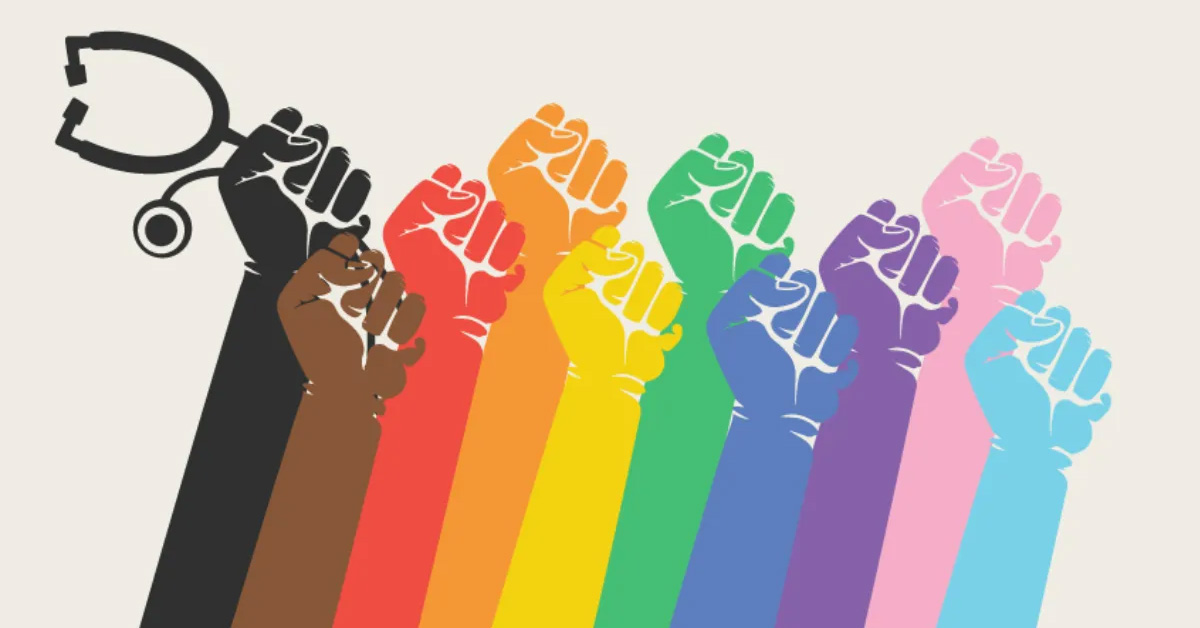Blog
For Pride Month, trans and non-binary nurses share the power of solidarity

This Pride Month, National Nurses United is honored to celebrate the history of organized, collective resistance embodied in the LGBTQIA+ liberation movement. Marking the anniversary of the legendary Stonewall uprising in New York City in 1969, Pride has become an annual tradition with deep connections to the radical roots of the gay liberation movement that took shape in the late ’60s and early ‘70s.
Today, LGBTQIA+ communities have benefited from the immense progress made since the days of police raids on mafia-run bars. But, as is so often the case, with progress comes backlash. As visibility increases, those made visible can become clearer targets.
One of the most alarming forms of this backlash today is the campaign in state legislatures nationwide to criminalize gender-affirming care for transgender patients. To get an understanding of what this all means for trans and gender non-conforming people, nurses, and our patients, we talked with union nurse members — one who’s trans and one who’s non-binary — about what’s happening.
Dara Tep, RN, is a nurse at Keck Medicine University of Southern California in Los Angeles. Recently, Tep waged and won a campaign with her coworkers to get her gender-affirming care covered under their insurance plan.
“Even though it was just one paragraph that was changed in the policy, it’s a life-changing thing and something I’m really proud of,” Tep told NNU. “And it’s something my coworkers are proud of, too.”
Tep said the solidarity she felt with her coworkers was instrumental in making her story a success, as their allyship showed management she wasn’t alone, forcing them to be more responsive to the strength of the nurses’ numbers. Before that, she had jumped through every hoop for gender-affirming care that had been put before her, but their support helped her cross the finish line on some key pieces of her health care. That was especially meaningful to her given the broader conversations happening.
“There’s already a stigma against our community,” she said. “Health care really hasn’t been inclusive of the trans community in the past couple of years. So, it’s nice to be able to start a change or create a change that makes health care more inclusive.”
Tep has since talked with other folks at her facility about the policy change her campaign has created, which covers not just employees but their family members. She said, “It’s rewarding to know that it’s not only going to help me, but it’s going to help everybody.”
Tep’s story is an inspiring story of the power of solidarity, but she’s not alone as a trans nurse feeling that power. For another NNU nurse across the country, the fight is for gender-affirming care and against efforts to restrict or criminalize it.
Zo Schmidt, RN, works at Research Medical Center in Kansas City, Missouri. On the state line with Kansas, Schmidt said that, while their city has been declared a sanctuary for people seeking gender-affirming care, the local gender non-conforming community has to worry about draconian policies being enacted by two different states, both of which have recently targeted trans and gender non-conforming people. Kansas lawmakers recently overrode a gubernatorial veto to enact a sweeping bathroom bill threatening access to public restrooms. In Missouri, a recent judge’s ruling blocked expansive restrictions on gender-affirming care the state’s attorney general sought to impose.
“Just having that legislation targeting the existence of me and my loved ones, just knowing there are this many people in positions of power trying to eliminate us is scary,” Schmidt, who uses they/them pronouns, shared. Through it all, Schmidt said they feel lucky their coworkers have had their back and work together to ensure Schmidt feels safe and affirmed at work, which is especially important at a time like this.
As a medical provider, Schmidt also sees potential health implications of these policies, pointing out that forcing patients off of medications like hormone replacement therapy (HRT) can have health implications beyond gender presentation.
“If patients are forced to suddenly go off their hormone therapy, that can have major physical and mental health repercussions,” Schmidt said. “If things go through, you could see patients resorting to off-label or black-market HRT.”
“People are going to resort to it, even if there are risks. I don’t blame them — it’s health care,” they said. “Same sort of thing with the abortion laws: Patients are still going to need abortions and seek them out. Whether or not they are legally, medically supervised is another matter altogether. But it’s still going to happen regardless.”
For a non-binary nurse like Schmidt, there’s a special irony to the concerns about gender-affirming care. They know firsthand the benefits it brings and find it odd that there’s so much attention focused on forms of health care that have lower rates of patient regret than knee replacement surgeries.
“I think it’s so important that medical professionals are very outspoken in their advocacy for trans patients,” Schmidt said, advising that pronoun pins and rainbow badge buddies can be a boon to patients. “Anything anyone can do to make folks feel safe is important.”